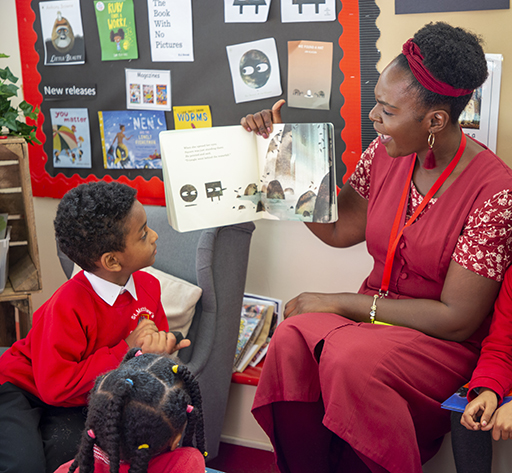5 Applying RfP pedagogy
By now, you will have developed a sound understanding of RfP pedagogy, which encompasses reading aloud, reading time, informal book talk and recommendations in a highly social reading environment. Using this knowledge, have a go at helping the educators in Activity 3 with their RfP dilemmas. You will then move on to focus further on how to develop yourself as a Reading Teacher.

Activity 3 Responding to RfP dilemmas
Listen to these three short audio clips, in which three educators briefly talk about a dilemma they have encountered in fostering a culture of Reading for Pleasure in their schools and classrooms. Select one educator’s dilemma and use the knowledge you have developed through this course to write a letter, or just some bullet points, offering advice to them.
Transcript: Audio 1
Comment
You might have started by reminding Emily that the will to read influences the skill to read and vice versa, so it is important that children have access to decodable books and a range of books and other texts that will inspire them to want to read.
By reading aloud every day and introducing children to a wide range of books, they might be inspired to revisit those texts and begin to expand their repertoires. You might have suggested that Emily makes the reading environment comfortable and a social space. Children will find books in common to re-read, discuss with friends and recommend to one another. By including clear sections for decodable texts, picture fiction, non-fiction, poetry, comics and so forth, Emily will ensure children have a rich and varied reading diet, encouraging them to become both keen and proficient readers.
Transcript: Audio 2
Comment
It seems that one of the main issues for Michael is the misconception that engaged reading is an individual and silent activity. His dilemma highlights that building communities of readers and developing a shared understanding of Reading for Pleasure pedagogies are vital parts of whole school development, which includes school governors and parents too.
You might have suggested that Michael offers to speak to the Governing Body about research-informed Reading for Pleasure pedagogies and how they are being implemented in the school. He may have to explicitly point out the links between the pedagogies being developed and the National Curriculum. It might also be helpful if Michael invited the Literacy Governor back to take part in independent reading time and join in the discussions, rather than observe from the door; they might be quite surprised at the depth and sophistication of children’s conversations. Furthermore, Governors could be directed to The Open University Reading for Pleasure website, or to some of the research informed literature around Reading for Pleasure.
Transcript: Audio 3
Comment
There is no doubt that developing knowledge of a wide range of children’s literature takes time and commitment; knowing where to start can be tricky. Book recommendations do not only help children choose appropriate texts, but they are also crucial for all adults working with children. You might have suggested a staff book club, or staff room book recommendations shelf (similar to the peer recommendation shelf in Jon Biddle’s case study in Session 5).
There is sometimes a misconception that children should be moving toward chapter books as soon as possible, so you might have stressed the significance of picture books. Another good starting place is looking at the short lists and winners of various children’s book awards, such as the CILIP Carnegie and Kate Greenaway Awards or United Kingdom Literacy Association Children’s Book Awards. You might have suggested that Charlotte spends sometime in the school library, as long as it is well stocked and well presented. Well organised libraries are important for children to find texts that tempt, but are also important for teachers, teaching assistants and parent helpers to find great books to read with children.
